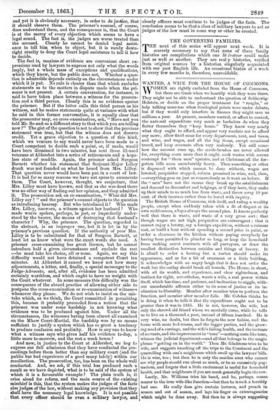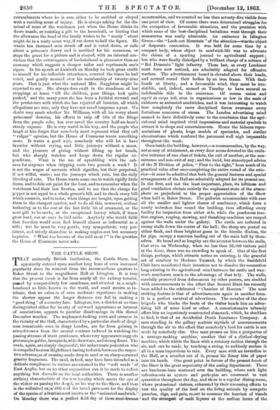WANTED, A WIFE FOR 'THE HOUSE OF COMMONS.
WOMEN are rightly excluded from the House of Commons, but there are times when we heartily wish they were there. They might not be able to understand the question of Schleswig- Holstein, or decide on the proper treatment for "roughs," or
help talking nonsense when theological points were under debate, but if they would only interfere in finance they might save us millions a year. At present, members control, or affect to control, what they ought to afford, and appear very resolute not to afford any more; allow fixed sums for every department, rent, and taxes, and wine, and wages, and all the big items, except occasional
travel, and keep accounts often very zealously. Yet still some- how the account runs up, the scrub-brushes are never allowed for, everything costs more than it ought, cook wastes with serene contempt for "them men" upstairs, and at Christmas all the for- gotten bills seem unendurably heavy. Then something or other is dispensed with which cannot be done without, wages are lowered, perquisites stopped, reform promised in wine, and, then, —everything goes on just as remorselessly as it went on before. If the "men" have not the means they break up the establishment and descend to discomfort and lodgings, or if they have, they make up their minds to so much loss from waste, and throw away 10 per cent, of their incomes rather than be bored with inquiry.
The British House of C01111110118, rich itself, and ruling a wealthy people, except when suddenly taken with a fit of disgust at its own recklessness, adopts always the second plan. It knows perfectly well that there is waste, and waste of a very gross sort; that though wages are not high, perquisites are extravagant; that it cannot enjoy a luxury, say a foreign expedition, without a ruinous cost, or build a boat without spending a second price in paint, or order a clearance in the kitchen without paying everybody for having been permitted to plunder so long, or keep the household from making secret contracts with all purveyors, or draw the smallest dictinction between eatables and things of luxury. It is afraid to order a herring lest a turbot should make its appearance, and as for a bit of ornament or a little building, it acknowledges with an angry laugh that it dare not order the work lest the outlay should break all bounds. The House, in short, with all its wealth, and experience, and clear sightedness, and instinct for right, nevertheless, wants a wife, a real power within itself, which has time, and patience, and inclination to niggle, with- out unendurable affronts either to its sense of justice or its in- clination to liberality. Member after member tries to perform the function, and member after member fails. Mr. Cobden thinks he is doing it when he tells it that the expenditure ought not to be greater than it was in 1835. He is not, however, the wife, but only the shrewd old friend whom we mentally curse, while he tells us to live on a thousand a year, instead of fifteen hundred. He is very wise, no doubt, but then he forgets the new babies, and the house with more bed-rooms, and the bigger parties, and the grow- ing need of a carriage, and the wife's failing health, and the increase of servants, and the improvement in" tone"—nothing costs like tone, witness the judicial department—and all that belongs to the magic phrase "getting on in the world." Then Mr. Gladstone tries to be wife, and suggests knocking off the trips to the Continent and the quarrelling with one's neighbours which swell up the lawyers' bills. He is wise, too ; but then he is only the maiden aunt who cannot see why people should ran about so much, or be so excessively pug- nacious, and forgets that a little excitement is useful for household health, and that neighbours if you are meek generally begin the row.
Lastly, Mr. Williams tries his hand, and he, perhaps, comes nearer to the true wife-like function—but then he is such a horribly bad one. He really does give curtain lectures, and preach in season and out of season, and lays his finger on extravagancies which might be done away. But then he is always suggesting
retrenchments where he is sure either to be snubbed or obeyed with a rankling sense of injury. He is always asking for the dis- missal of some of the watchmen just when the House thinks its doors unsafe, or resisting a gift to the household, or hinting that the allowance the head of the family wishes to be " manly " about might do in a nasty mean way, if cut down to half the figure. He wants ten thousand men struck off and is voted down, or rails about a princess's dowry and is snubbed for his meanness, or stays the grant for a picture and is obeyed, with an internal con- viction that the extravagance of bachelorhood is pleasanter than an economy which suggests a cheaper tailor and reprimands one's cigars. In his speech at Lambeth on Monday he took great credit to himself for his inflexible attendance, counted the times he had voted, and gently moaned over his membership of twenty-nine years. That is just what the national Mrs. Naggleton might be expected to say. She always does exult in the steadiness of her stoppings at home "till the children, poor things, look quite peaked," and the many years she has been a faithful steward, and the persistence with which she has rejected all luxuries, all which allegations are true, only they have not saved tenpence a year. We doubt very much whether Mr. Williains, with all his worry about princesses' dowries, his efforts to snip off bits of the fringe from the purple robe, has ever saved the country half-an-hour's steady expense. He is very useful in his way, and the people who laugh at him forget that somebody must represent what they call "
vulgar" opinion, but the House of Commons wants something more. It wants a good wife, somebody who will let it have luxuries without crying, and little journeys without a moan, and the pleasure of giving without lifting up her hands, but who sharply watches and keeps down the regular ex- penditure. What is the use of squabbling with the cab- man for sixpence when dripping costs two pounds a 'week? It is not the wages of servants which signifies, but their perpetual, if not wilful, waste ; not the journeys which ruin, but the daily bleeding of coin. The House wants some one to watch rigidly little items, and to dole out paint for the boat, and to remember when the watchmen had their last liveries, and to see that the charge for pepper in not equal to a whole grocer's bill, and to check every bill which comes in, and to insist, when things are bought, upon getting them in the cheapest market, and to do all this, moreover, without bothering as to the cost of the last little bit of ornament, or the next gift to be made, or the exceptional luxury which, if times grow hard, can at once be laid aside. Anybody who would fulfil that function would soon find himself almost as influential as a wife ; but he must be very gentle, very sympathetic, very per- sistent, and utterly shameless in making unpleasant but necessary inquiries. "What has become of the cold meat ? " is the question the House of Commons never asks.



































 Previous page
Previous page